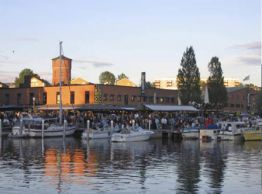Project Aim
The aim of the Town-Net project was to make a significant contribution to achieve stronger, more competitive town networks through greater complementary and co-operative measures to aid in spatial development between the municipalities concerned. Through this, the project has built on the particular strengths and potential of the different towns concerned which in turn has lead to a greater specialisation and differentiation, as well as a more competitive and cohesive town network. In short to show that a group of towns situated close to each other can co-operate and complement each other is a clear way that the region as a whole will profit.
Project implementation and results
The project has been a catalyst and also provided a transnational structure for colaboration. It enabled activity that would not have happened otherwise – this includes hiring external experts, research and developing strategy. Furthermore, the partners were really in the beginning of the process of building cooperative working relationships between towns and cities that have long been rivals. Town-Net has worked in the following fields:
• Economic cooperation,
• Infrastructure connections,
• Spatial quality and
• Regional identity.
The development of a structural framework for coordinating investment promotion activities can be seen as a first step for competing areas. As an example the city of Bremen (DE) will deepen its regional cooperation under the new label "European Metropolitan Region Bremen-Oldenburg in the Northwest".
Pilot projects
Furthermore the Internet/GIS pilot developed by Agdertown in economic cooperation is unique. This innovative idea with the GIS-based register is a way to register ‘uses’ about automatically updated information on industry and business and as well, make it an open source for use as planning tool. Besides, the Joint Land Policy-pilot in the South Frisian Towns Area has to be mentioned as a new approach for trans-boundary trade areas.
Innovative solutions
The importance of public participation in urban development processes was particularly significant. Projects not only find new solutions and innovative ideas for local development but also build up confidence for future planning processes by bringing together local stakeholders, entrepreneurs and inhabitants. For instance the introduction of a “Quality Team”, linked to which were methods to find out what the spatial quality of a certain area is, demonstrated an innovative solution for spatial development.
Joint transnational strategy
Mode of cooperation
The network established by the Town-Net project has created trade and other exchange links. Through cooperation, towns and cities could avoid the situation where resources were wasted, which is often attributed to by competition. It would also attract new business and produce better planning strategies, a process that is being achieved through integration.
A particular example of cooperation is that which is being undertaken by the three East Midland cities of Derby, Leicester and Nottingham (UK). They are working together under the Three Thinking banner to demonstrate how the whole area can be more competitive by jointly marketing its strengths to other UK regions and overseas in order to attract inward investors. Through this cooperation they have created for themselves an identity which will help to bolster efforts in obtaining this objective.
Impact of the project
A concrete benefit for some regions was that by cooperating as a region as a whole, they increased status with regards to national policy. Examples were the 'urban networks' in the Netherlands and the “National Centres” in Denmark. In the Netherlands, the 'urban networks' has contributed to the approved Strategic Spatial Plan for the South Frisian Towns Area. The plan set out the main proposals for housing, employment, landscape and infrastructure up to the year 2030. These proposals were very strategic and needed to be worked out in more detail prior to implementation. This was the focus in the Town-Net project.
The Danish Town Network has received the status of “National Centre” looking to investigate how other regions developed a common strategy. The Common Spatial Planning Strategy was approved by the four cities in the spring of 2005, binding them for the first time in a common agreement for future development.
Finally rules for cooperation in the field of trans-boundary environmental mitigation, which was to be applied continuously and undergo yearly evaluation, was established. Town-Net provided a focus for discussion and activity within the regions, as well as between them, it has provided a catalyst for cooperation on the regional and transnational scales. |

Improved quality of life offered by ever-present water and identified as strength for the region as a whole, Karlsstad, Sweden
Partners Province of Fryslân, NL
Derby City Council, UK
Municipality of Struer, DK
Aust-Agder Fylkeskommune, NO
Der Senator für Bau, Umwelt und Verkehr, DE
Municipality of Karlstad, SE
LP:
Province of Drenthe
Project Manager
Martijn Warmerdam
Provinciehuis, Westerbrink 1 Postbus 122
NL-9400 AC Assen
The Netherlands
m.warmerdam@drenthe.nl
www.town-net.nl
Tel: +31 20 407 2000
Measure: 1.1
Start Date: 01 May 2003
End Date: 31 May 2006
ERDF Grant:
 2.252.037,00 2.252.037,00
Total Eligible Sum:
 4.504.073,00 4.504.073,00
|